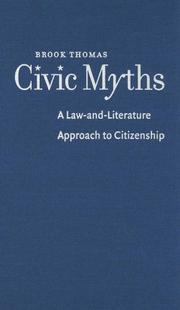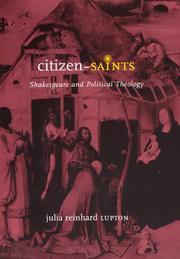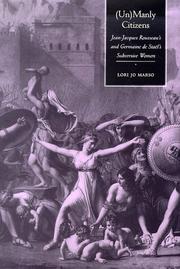| Listing 1 - 10 of 36 | << page >> |
Sort by
|
Book
ISBN: 0300156642 9780300156645 9780300155419 0300155417 Year: 2013 Publisher: New Haven Yale University Press
Abstract | Keywords | Export | Availability | Bookmark
 Loading...
Loading...Choose an application
- Reference Manager
- EndNote
- RefWorks (Direct export to RefWorks)
Spanning nearly 500 years of cultural and social history, this book examines the ways that literature and surveillance have developed together, as kindred modern practices. As ideas about personhood-what constitutes a self-have changed over time, so too have ideas about how to represent, shape, or invade the self. The authors show that, since the Renaissance, changes in observation strategies have driven innovations in literature; literature, in turn, has provided a laboratory and forum for the way we think about surveillance and privacy. Ultimately, they contend that the habits of mind cultivated by literature make rational and self-aware participation in contemporary surveillance environments possible. In a society increasingly dominated by interlocking surveillance systems, these habits of mind are consequently necessary for fully realized liberal citizenship.
Self in literature. --- Privacy in literature. --- Citizenship in literature.

ISBN: 9780807831533 9780807858462 Year: 2007 Publisher: Chapel Hill University of North Carolina press
Abstract | Keywords | Export | Availability | Bookmark
 Loading...
Loading...Choose an application
- Reference Manager
- EndNote
- RefWorks (Direct export to RefWorks)
American fiction --- Citizenship in literature --- Citizenship --- History and criticism --- History

ISBN: 0226496694 Year: 2005 Publisher: Chicago ; London The University of Chicago Press
Abstract | Keywords | Export | Availability | Bookmark
 Loading...
Loading...Choose an application
- Reference Manager
- EndNote
- RefWorks (Direct export to RefWorks)
Christian saints in literature --- Citizenship in literature --- Shakespeare, William

ISBN: 0801860326 Year: 1999 Publisher: Baltimore The Johns Hopkins University Press
Abstract | Keywords | Export | Availability | Bookmark
 Loading...
Loading...Choose an application
- Reference Manager
- EndNote
- RefWorks (Direct export to RefWorks)
Women in literature --- Citizenship in literature --- Feminism and literature
Book
ISBN: 9783039111381 Year: 2007 Publisher: Frankfurt am Main [etc.] Peter Lang
Abstract | Keywords | Export | Availability | Bookmark
 Loading...
Loading...Choose an application
- Reference Manager
- EndNote
- RefWorks (Direct export to RefWorks)
Homer --- Citizenship in literature --- Epic poetry, Greek --- History and criticism --- Homer.
Book
ISBN: 1316028399 1316028879 1316258726 1316029840 1316030326 1316032248 1316026744 1316031284 1107084466 1107446392 Year: 2015 Publisher: Cambridge : Cambridge University Press,
Abstract | Keywords | Export | Availability | Bookmark
 Loading...
Loading...Choose an application
- Reference Manager
- EndNote
- RefWorks (Direct export to RefWorks)
Nation and Citizenship in the Twentieth-Century British Novel charts how novelists imagined changing forms of citizenship in twentieth-century Britain. This study offers a new way of understanding the constitution of the nation-state in terms of the concept of citizenship. Through close readings, it reveals how major authors such as E. M. Forster, Virginia Woolf, Elizabeth Bowen, Sam Selvon, Buchi Emecheta, Salman Rushdie, and Monica Ali presented political struggles over citizenship during key historical moments: the advent of democracy, the emancipation of women, the rise of social-welfare provision, the institution of the security state during World War II, and the emergence of multicultural citizenship during postwar immigration. This serves as the first full-length monograph to map the interrelations between literary production and public debates about citizenship that shaped Britain in the twentieth century.
Multi
ISBN: 9781399506731 1399506730 9781399506748 1399506749 9781399506717 1399506714 Year: 2023 Publisher: Edinburgh Edinburgh University Press
Abstract | Keywords | Export | Availability | Bookmark
 Loading...
Loading...Choose an application
- Reference Manager
- EndNote
- RefWorks (Direct export to RefWorks)
This book argues that the rapid development of anti-vagrancy laws in the late nineteenth century, which were written alongside widespread public fascination with 'tramps', facilitated a transatlantic dialogue between sources eager to modernize the state's ability to describe, catalogue, and manage this roving population. Almost always depicted as white, solitary, and artistic, the tramp character was once a menacing threat to society only to disappear from the public eye by the postwar period. This book brings to light the often-surprising lines of influence between authors, sociologists, and government authorities who alike seized on the social panic around tramping in order to reimagine the relation of work to national citizenship.
Thematology --- Rogues and vagabonds in literature. --- Tramps in literature. --- Citizenship in literature. --- Sans-abri. --- Citoyenneté.
Book
ISBN: 9781009372602 1009372602 9781009372589 1009372580 9781009372572 1009372572 9781009539326 9781009372596 Year: 2024 Publisher: Cambridge, England : Cambridge University Press,
Abstract | Keywords | Export | Availability | Bookmark
 Loading...
Loading...Choose an application
- Reference Manager
- EndNote
- RefWorks (Direct export to RefWorks)
This Element concerns the civic value of contemplation in Plato and Aristotle: how does intellectual contemplation contribute to the happiness of the ideal state? The texts discussed include the Republic, the Nicomachean Ethics and the Politics, works in which contemplation is viewed from a political angle. The Element concludes that in the Republic contemplation has purely instrumental value, whereas in the Politics and Nicomachean Ethics it has purely intrinsic value. To do justice to the complexity of the issues involved, the author addresses a broader question about the nature of civic happiness: whether it is merely the aggregate of individual happiness or an organic quality that arises from the structure of the state. Answering this question has implications for how contemplation contributes to civic happiness. The Element also discusses how many citizens Plato and Aristotle expected to be engaged in contemplation in the ideal state.
Contemplation in literature. --- Happiness in literature. --- Citizenship in literature. --- Aristotle. --- Plato.
Book
ISBN: 2846270767 9782846270762 Year: 2002 Publisher: Paris: Presses universitaires franc-comtoises,
Abstract | Keywords | Export | Availability | Bookmark
 Loading...
Loading...Choose an application
- Reference Manager
- EndNote
- RefWorks (Direct export to RefWorks)
Classical literature --- Citizenship in literature --- History and criticism --- Citoyenneté (droit grec) --- Citoyenneté (droit romain) --- Grèce --- Rome --- Politique et gouvernement --- Grèce --- Classical literature - History and criticism - Congresses. --- Citizenship in literature - Congresses. --- Citoyenneté (droit grec) --- Citoyenneté (droit romain)
Book
ISBN: 9781107084469 9781316026748 9781107446397 Year: 2015 Publisher: Cambridge Cambridge University Press
Abstract | Keywords | Export | Availability | Bookmark
 Loading...
Loading...Choose an application
- Reference Manager
- EndNote
- RefWorks (Direct export to RefWorks)
Nation and Citizenship in the Twentieth-Century British Novel charts how novelists imagined changing forms of citizenship in twentieth-century Britain. This study offers a new way of understanding the constitution of the nation-state in terms of the concept of citizenship. Through close readings, it reveals how major authors such as E. M. Forster, Virginia Woolf, Elizabeth Bowen, Sam Selvon, Buchi Emecheta, Salman Rushdie, and Monica Ali presented political struggles over citizenship during key historical moments: the advent of democracy, the emancipation of women, the rise of social-welfare provision, the institution of the security state during World War II, and the emergence of multicultural citizenship during postwar immigration. This serves as the first full-length monograph to map the interrelations between literary production and public debates about citizenship that shaped Britain in the twentieth century.
| Listing 1 - 10 of 36 | << page >> |
Sort by
|

 Search
Search Feedback
Feedback About UniCat
About UniCat  Help
Help News
News